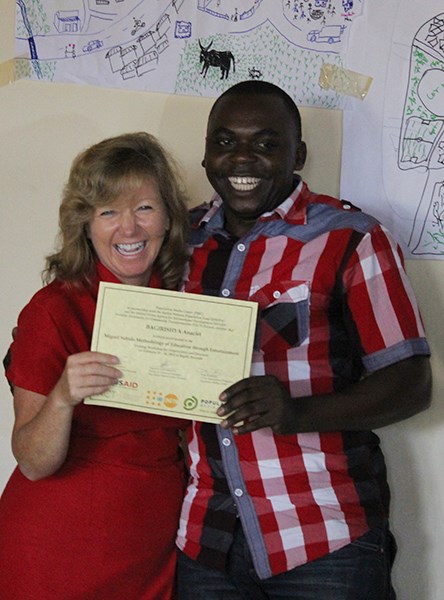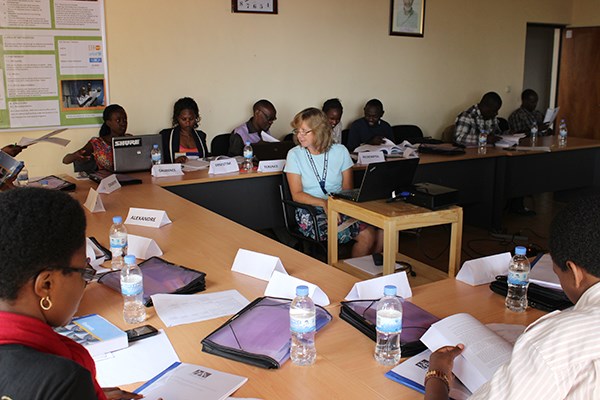SHELBURNE, Vt., May 19, 2014 (GLOBE NEWSWIRE) -- When Kriss Barker first met Bill Ryerson in Washington DC, she thought he must be mistaken. It was 2001, and Barker, an expert in public health communications, didn't think the numbers Ryerson was reciting were possible. Ryerson was discussing a communications effort in Tanzania that has used a strategy Barker was unfamiliar with: the Sabido Methodology.
"I was blown away," says Barker. "Those of us in the business of public health communication knew that you couldn't get real behavior change in a short time-frame. Maybe you could get knowledge change or attitude change, but certainly not behavior change." But Ryerson insisted, citing statistics like 82 percent of listeners saying they changed their behaviors to avoid HIV by limiting number of sexual partners and using condoms, and independent data from the Tanzanian government showing a 153 percent increase in condom distribution in broadcast areas during the first year.
Barker had invited Ryerson to DC after hearing about his organization, Population Media Center (PMC). PMC works to improve the health and well-being of people around the world with entertainment-education strategies, focusing on soap operas using the Sabido methodology.
"This is a really dynamic methodology," says Barker. "The stunning results are what drew me to PMC and to Sabido." By the end of 2002 Barker was the Vice President of International Programs at PMC. Since that time, she has trained producers and writers for more than 30 different TV and radio shows.
What is Sabido?
Take a well-written, engaging, emotional soap opera and then add an underlying framework that unobtrusively yet obviously weaves in social issues like HIV/AIDS, women's rights, family planning, or environmental preservation and you may have found an example of a Sabido soap opera.
The stories feature "positive," "negative," and "transitional" characters that realistically model behavior in long-running serial dramas, relying on extensive formative research to develop the characters and storylines. Over the course of broadcast, which can be years, audiences develop bonds with characters and learn vicariously through each character's decisions and the repercussions.
According to Barker, the Sabido methodology works for a number of reasons, primary among them is its entertainment factor. She emphasizes that it must be a thrill for the audience to listen or watch the program – otherwise it won't work. The second reason for its success is that it's based on proven psychological theories. She explains that Miguel Sabido, who pioneered the methodology in the 1970s, worked to understand why his methodology was so effective. For instance, Sabido's insertion of a "transitional" character drastically increased behavior change adoption. Sabido wondered why until he found Albert Bandura's Social Learning Theory, which is an influential theory of learning and development and explains the importance of observational learning.
"We're Sabido purists," Barker says of PMC's approach to serial dramas, "It's actually highly formulaic but that's why it's replicable. It works for all people in all places. It doesn't teach creativity – the writers have to bring that on their own. But it's the same steps every time."
These steps have achieved incredible results. For example, married women who listened to Yeken Kignit in Ethiopia increased their use of family planning by 31.2 percentage points (12.3 percent to 43.5 percent). In Nigeria, 72.4 percent of the population listened to PMC's show, Ruwan Dare. One impact of this incredible listenership was 67 percent of new clients at clinics naming Ruwan Dare as the direct or indirect source influencing them to seek family planning or reproductive health services for the first time.
How do you train someone in Sabido?
After training producers and writers for more than 30 serial dramas and conducting numerous workshops, Barker may be the world's foremost expert at training people in the Sabido methodology. In fact, it's her work that has led PMC to create a network of Sabido trainers from 15 countries speaking 15 different languages.
"I've trained trainers, but I've also trained writers and producers who become trainers," Barker explains. "If you really understand what you're doing, you can teach the methodology. Each show looks completely different, but the basic structure is the same every time. And that's what's so fantastic about it. We train one person and that person can train another person, and another. We're developing a network of people who have valuable knowledge about how to effect behavior change with a powerful communications tool."
"Kriss brings her planning expertise and her knowledge of the methodology to the trainings," says Tom Kazungu, one of PMC's trainers and the first African ever trained in the Sabido methodology by Miguel Sabido. "She works well with people from many different backgrounds and different levels of knowledge."
Barker, who has lived all over the world, explains that trust is the most important part of the trainings, on both sides. The participants have to be open to learning a new skill and the trainer has to trust that the participants will understand and succeed. This is crucial because trainers are not lecturers; they have to employ active participation and exploration from the participants in order to be successful.
"My trainings got a lot better a couple of years ago," Barker says as she talks about getting her doctorate in communications, focusing on successful entertainment-education. "There's a point at which you have to step away. You have to be confident in the methodology and the participants' ability to understand it. I put everything out on the table and then watch them take it from there."
For Barker, every training workshop has parts that she identifies as a lot of fun, but the part she enjoys the most is creating the storylines.
"I love the storylines. That's the best part for several reasons. For instance, that's when you really discover if the script writers and producers understand all the elements, things like characters, triggers, repercussions. But it's not just the gold standard proof of their understanding of the methodology, it's also just a lot of fun because you get to have conversations about characters," says Barker. "One minute you're killing a character off and the next minute you realize that you need that person later in the story."
Who knew that so much fun could be had creating such a powerful communications tool? PMC creates its own radio and TV serial dramas, as well as providing training and consultation for other serial dramas. PMC also conducts workshops for groups looking to learn more about Sabido, but who haven't yet committed to the production of a specific serial drama.
"We've had a few failures," says Barker, "but we know why it failed and what to avoid. With this methodology, it's not about luck. If done right, it works every time. We use Sabido and that's why we get these results."
ABOUT POPULATION MEDIA CENTER (PMC):
Population Media Center (PMC) is a nonprofit, international nongovernmental organization, which strives to improve the health and well-being of people around the world through the use of entertainment-education strategies, like serialized dramas on radio and television, in which characters evolve into role models for the audience for positive behavior change. Founded in 1998, PMC has over 15 years of field experience using the Sabido methodology of behavior change communications, impacting more than 50 countries around the world. www.populationmedia.org
Photos accompanying this release are available at:

